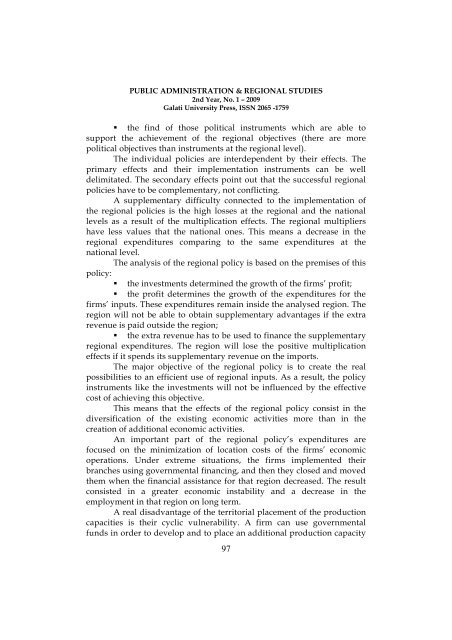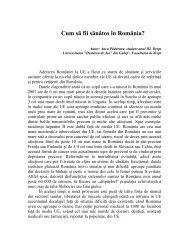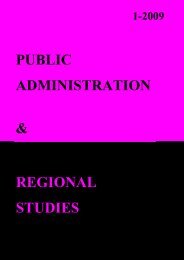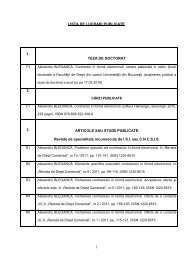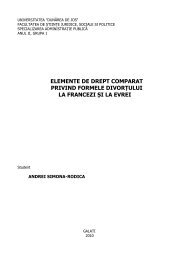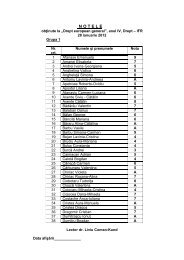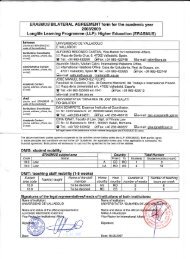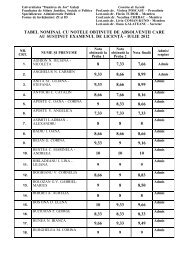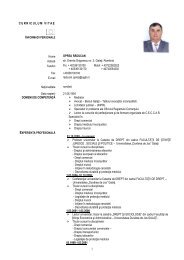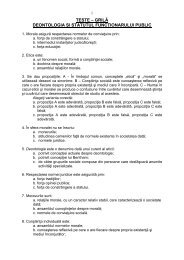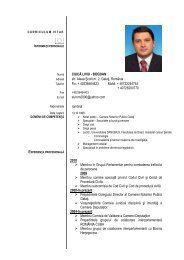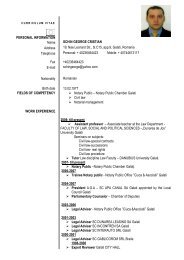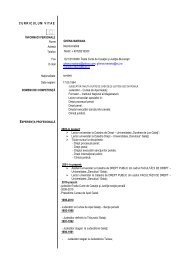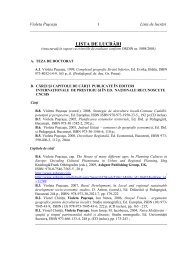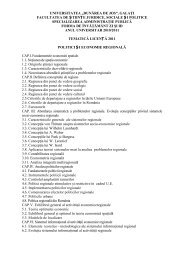regional studies public administration - Facultatea de Drept ...
regional studies public administration - Facultatea de Drept ...
regional studies public administration - Facultatea de Drept ...
You also want an ePaper? Increase the reach of your titles
YUMPU automatically turns print PDFs into web optimized ePapers that Google loves.
PUBLIC ADMINISTRATION & REGIONAL STUDIES<br />
2nd Year, No. 1 – 2009<br />
Galati University Press, ISSN 2065 -1759<br />
• the find of those political instruments which are able to<br />
support the achievement of the <strong>regional</strong> objectives (there are more<br />
political objectives than instruments at the <strong>regional</strong> level).<br />
The individual policies are inter<strong>de</strong>pen<strong>de</strong>nt by their effects. The<br />
primary effects and their implementation instruments can be well<br />
<strong>de</strong>limitated. The secondary effects point out that the successful <strong>regional</strong><br />
policies have to be complementary, not conflicting.<br />
A supplementary difficulty connected to the implementation of<br />
the <strong>regional</strong> policies is the high losses at the <strong>regional</strong> and the national<br />
levels as a result of the multiplication effects. The <strong>regional</strong> multipliers<br />
have less values that the national ones. This means a <strong>de</strong>crease in the<br />
<strong>regional</strong> expenditures comparing to the same expenditures at the<br />
national level.<br />
The analysis of the <strong>regional</strong> policy is based on the premises of this<br />
policy:<br />
• the investments <strong>de</strong>termined the growth of the firms’ profit;<br />
• the profit <strong>de</strong>termines the growth of the expenditures for the<br />
firms’ inputs. These expenditures remain insi<strong>de</strong> the analysed region. The<br />
region will not be able to obtain supplementary advantages if the extra<br />
revenue is paid outsi<strong>de</strong> the region;<br />
• the extra revenue has to be used to finance the supplementary<br />
<strong>regional</strong> expenditures. The region will lose the positive multiplication<br />
effects if it spends its supplementary revenue on the imports.<br />
The major objective of the <strong>regional</strong> policy is to create the real<br />
possibilities to an efficient use of <strong>regional</strong> inputs. As a result, the policy<br />
instruments like the investments will not be influenced by the effective<br />
cost of achieving this objective.<br />
This means that the effects of the <strong>regional</strong> policy consist in the<br />
diversification of the existing economic activities more than in the<br />
creation of additional economic activities.<br />
An important part of the <strong>regional</strong> policy’s expenditures are<br />
focused on the minimization of location costs of the firms’ economic<br />
operations. Un<strong>de</strong>r extreme situations, the firms implemented their<br />
branches using governmental financing, and then they closed and moved<br />
them when the financial assistance for that region <strong>de</strong>creased. The result<br />
consisted in a greater economic instability and a <strong>de</strong>crease in the<br />
employment in that region on long term.<br />
A real disadvantage of the territorial placement of the production<br />
capacities is their cyclic vulnerability. A firm can use governmental<br />
funds in or<strong>de</strong>r to <strong>de</strong>velop and to place an additional production capacity<br />
97


